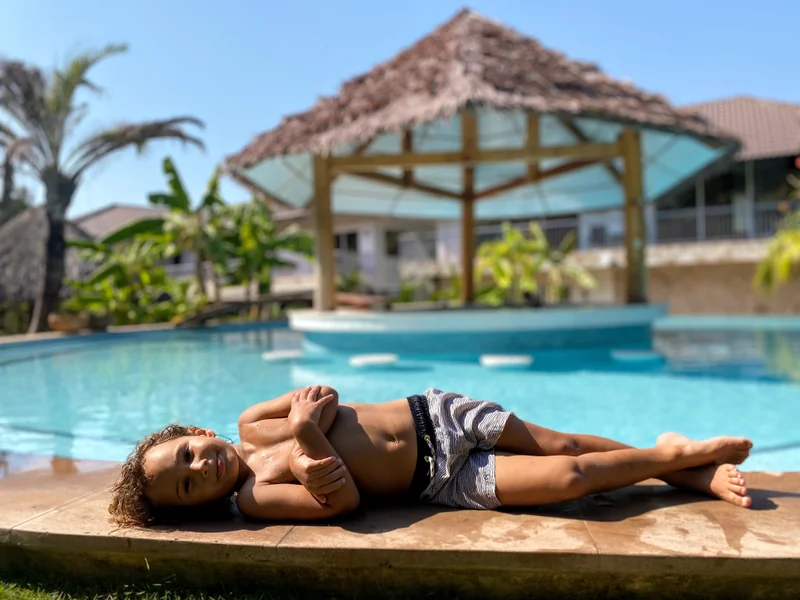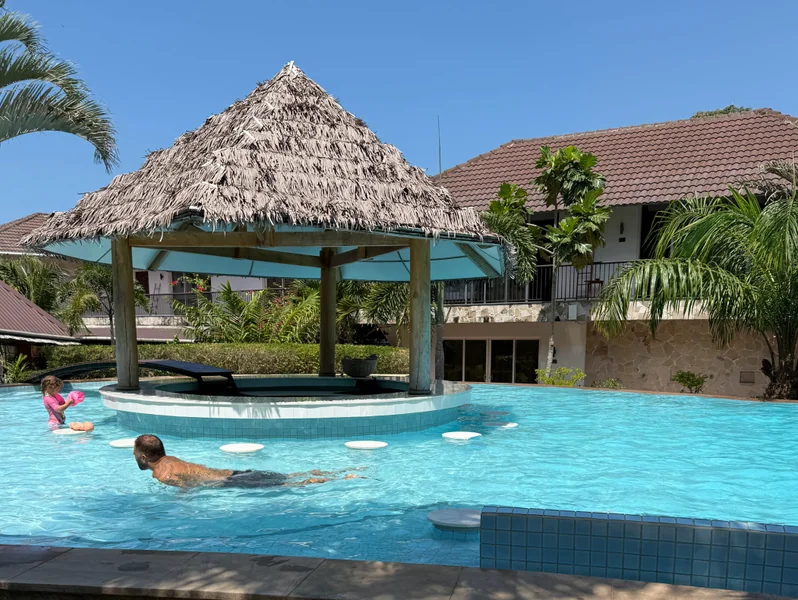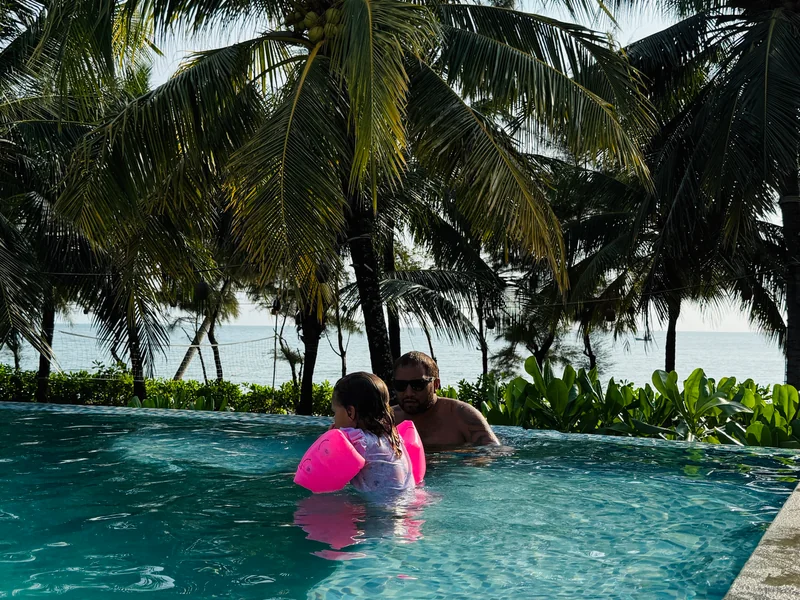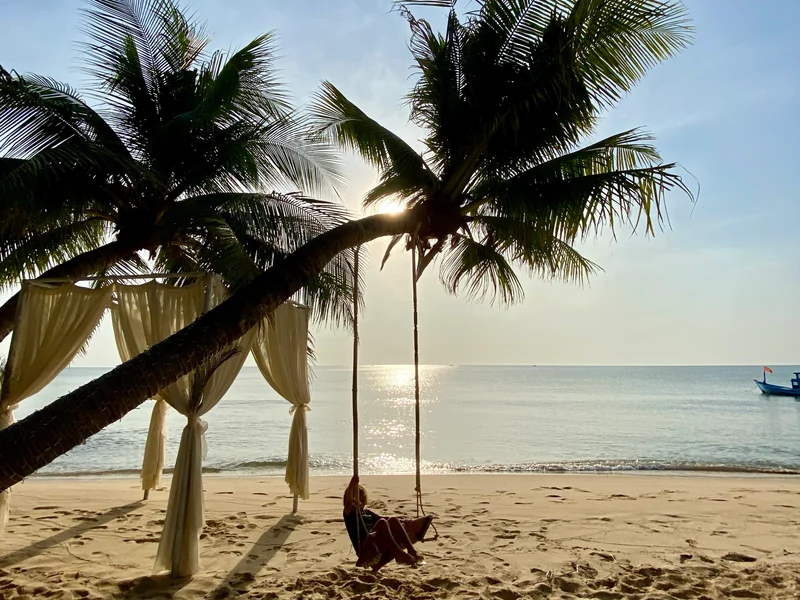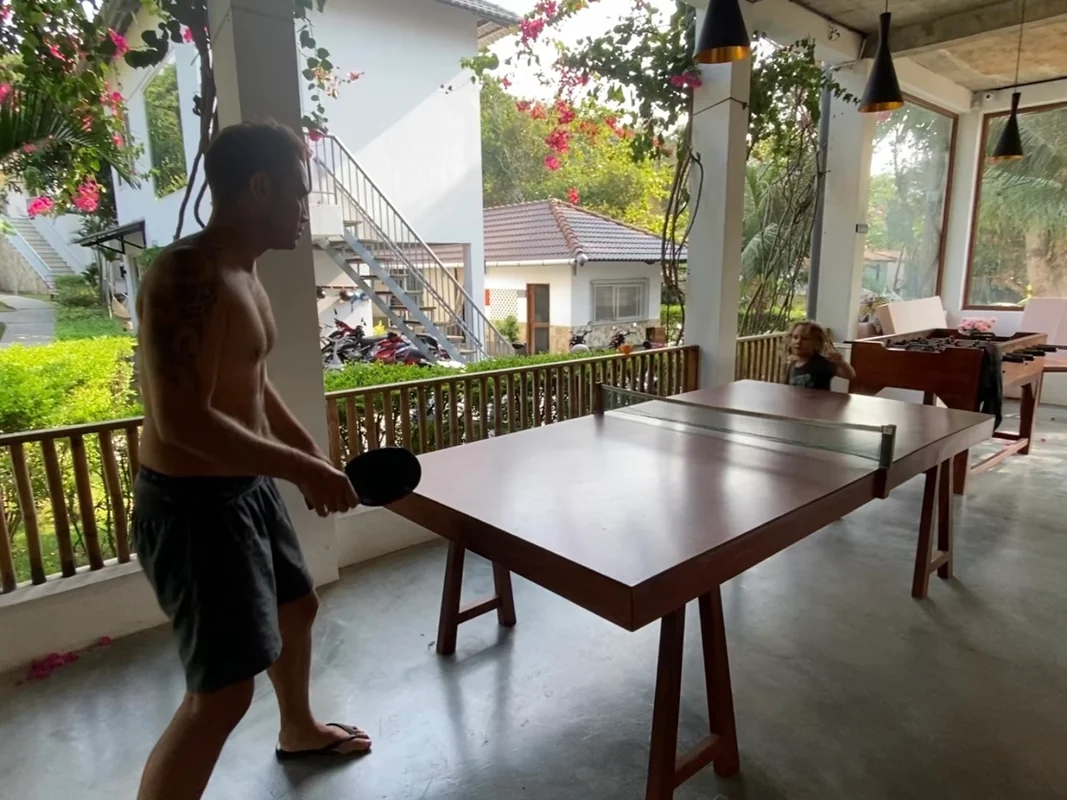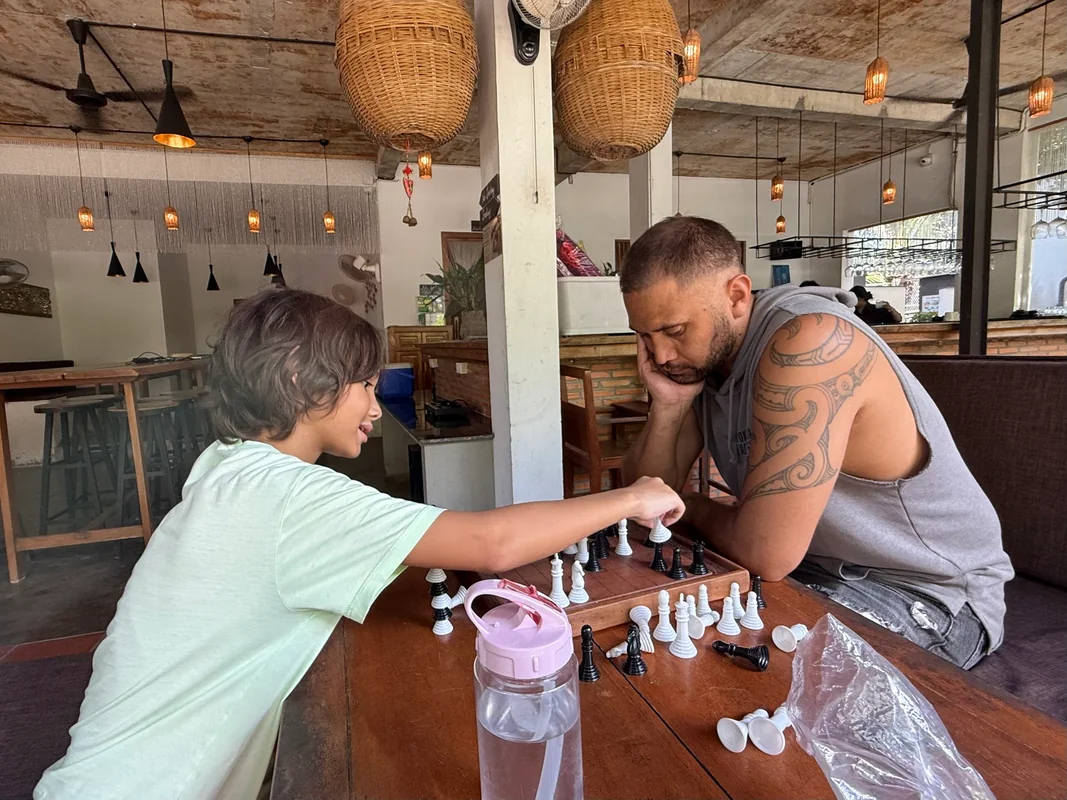Worldschooling Phu Quoc Island: Our Family Experience
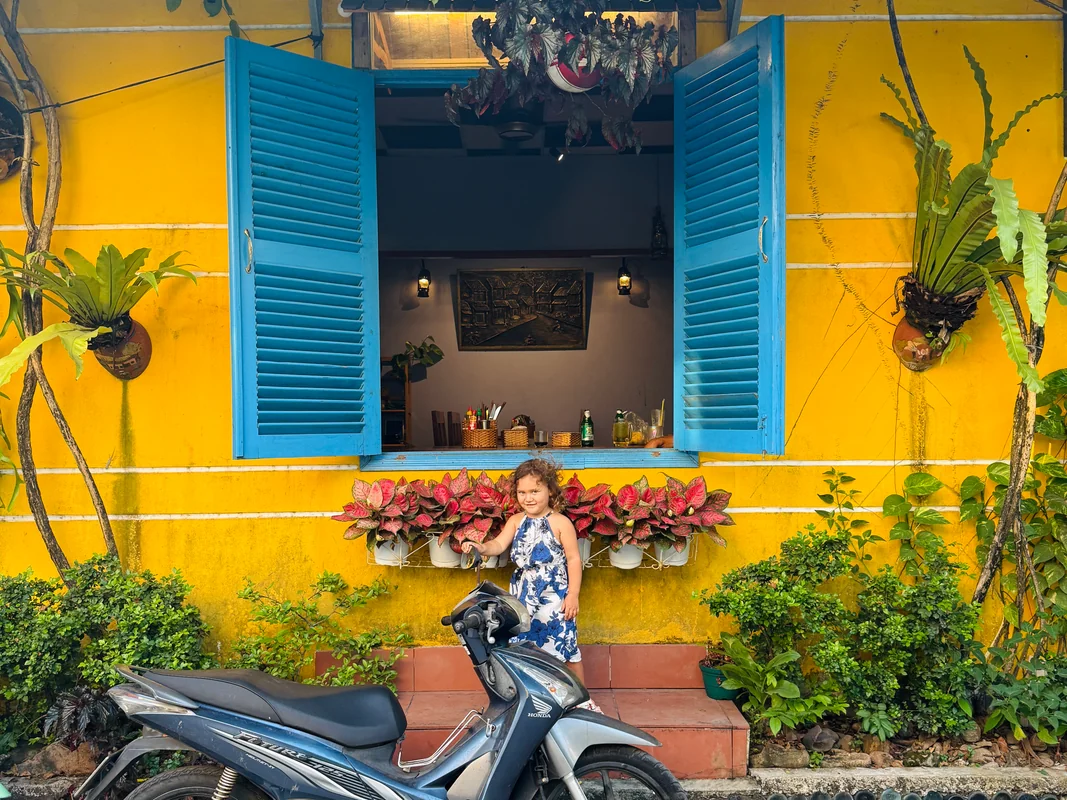
Island Worldschooling: Our Phu Quoc Family Experience
We thought we’d go to an island for a few weeks to escape the cold. We found a paradise that we initially remained on for three months, and we’ve returned every two years since! Here’s our take on worldschooling on Phu Quoc Island, Vietnam.
Table of Contents
Pro Tip: If it’s your first time visiting Vietnam, check out our guide with all you need to know about visiting Vietnam.
Introduction
Phu Quoc, an island off the southwestern coast of Vietnam, was never on our original round the world with kids itinerary. During our time stuck in Vietnam throughout the travel restrictions of 2020, we explored a lot of Northern and Central Vietnam. And after the October 2020 floods, we started feeling cold.
After spending Christmas in Phong Nha, we searched for options to escape the cold and enjoy some winter warmth. We boarded a train for Da Nang and then flew to Phu Quoc.
Disclosure: This post contains affiliate links. We earn a commission if you make a purchase at no additional cost to you. Contact us with any questions.
At the time, tourists were long gone. The only people remaining were people like us, and longer term expats and digital nomads who’d chosen to stay. Initially, we chose to stay in the north, near Ong Lang Beach. The area was like a ghost town. There wasn’t much open and it had a rather dead vibe. We weren’t keen to stay longer.
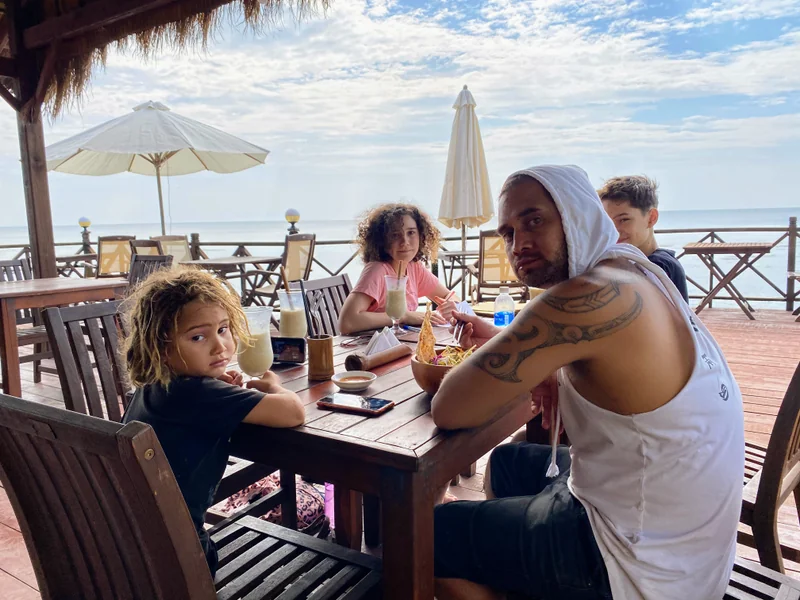
Looking at the map, it was hard to say where to go. So we chose something nearer to the city. The map on the booking app we used showed a coastal place, we gave that a try. The place wasn’t coastal, it was on the main street just up from the main markets. It was a bit noisy and not a vibe we wanted to stay in. We began to wonder if Phu Quoc was for us.
Next, we thought we’d give the Southern end of the island a try. We found a hotel and moved down. Again, we felt like we were in an abandoned ghost town. We walked through the ‘town square’ area. It was completely dead. I could imagine how it might be if there had been tourists around. But it wasn’t like that at all.
By this stage, I was almost ready to book tickets back to Da Nang. I just so happened to be searching the Phu Quoc expat groups to find out why people liked this island (I was seriously done), when I found the wonderful Le Forest Resort. I called and asked if we could come to take a look. That afternoon, we called in to see what would become our home for the next few months. Let’s just say, it was exactly what we needed to make Phu Quoc feel like a place we could live for a few months, and we’ve returned twice since.
In this post, I’ll share all our Phu Quoc secrets, and let you know why we think Phu Quoc is great for worldschooling adventures, especially during Vietnam’s winter time.
1. Executive Summary: Phu Quoc Island Life at a Glance
Quick Facts Table:
- Duration: 1-3 months (we’ve visited three times over the years)
- Island size context: 574 km² - takes about 2-3 hours to drive around the entire island, 45-60 minutes to cross from end to end
- Family size and kids’ ages: We’ve traveled with different age combinations:
- First visit: 3 kids (ages 4, 12, 13)
- Second visit: 4 kids (ages 1, 6, 14, 15)
- Third visit (2025): 4 kids (ages 3, 8, 16, 17)
- Monthly cost range:
- 2021: Very affordable during January-March during travel restrictions
- 2023: 20,000,000 VND ($820 USD / $1,172 AUD / $1,314 NZD) for 2-bedroom hotel room
- 2025: 30,000,000 VND ($1,230 USD / $1,758 AUD / $1,971 NZD) for three separate rooms including breakfast
- Best months for families: December-March (dry season) - we don’t think there’s a “worst” month!
- Transportation needs: Private cars or Grab rides work perfectly. For groups, Johns Tours can arrange mini-buses or regular buses with minimal notice
- Biggest island life challenge: Finding food variety - we tend to visit the same places repeatedly despite many options available
- Would we return: Absolutely! We love the friends we’ve made on the island and always look forward to returning
2. Island Living Reality Check
The Honest Truth About Island Worldschooling
Living on Phu Quoc can be a relaxing paradise. It really is for me. On our most recent visit, I wasn’t ready to leave after one month, so we stayed two.
For some people, this island life might be a bit boring. For me, as a sleep deprived mum with a full time remote job, this is exactly the kind of relaxing location I need. Probably every year is a good idea!!
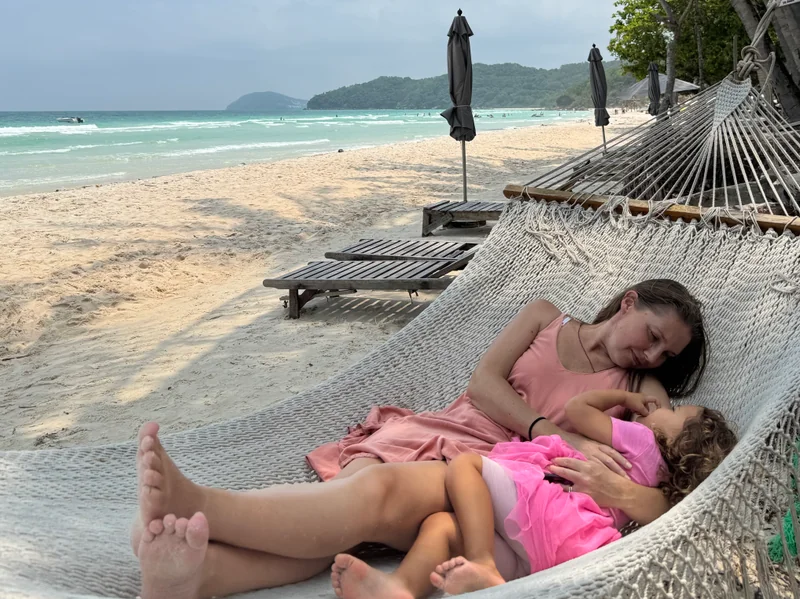
What we loved most:
- The slower pace of life
- Many natural learning opportunities
- A few expat families (you’ll always find travel families)
- Kids learning to entertain themselves in a safe environment
- Sharing Phu Quoc with some of our favourite travel friends as we enjoyed a worldschooling month in the warmth
- Ease to find everything we need at one handy shop (King Kong)
What challenged us during our most recent visit:
- Keeping the older teens entertained on our last visit
- A bit too many families on the resort compared to what we love, but still a great opportunity to meet other travel families
3. Accommodation for Month-Long Island Stays
Finding the right accommodation on Phu Quoc for a worldschooling family requires balancing several factors. Here’s what we learned from our experience:
Beachfront Villas
- Monthly rates: $800-2,500 USD +
- What’s included: Basic furniture, sometimes kitchen, internet
- Isolation factors: In the north, it’s beautiful but further than I like from supplies
- Best for: Families who prioritize beach access and don’t mind isolation and shorter stays
Cua Lap Neighborhood (resort and more basic options available)
- Integration opportunities: More variety of local food options, fresh fruit and vegetables in the alley
- Cost savings: 30-40% cheaper than beachfront
- Monthly rates: $800-2,000 USD
- Best for: Families wanting a more lively and local experience, plus more options for budget-conscious travelers
Essential Accommodation Features for Slow Travelling Worldschooling Families
Must-haves:
- Kitchen facilities if you’re staying more than a couple of weeks, it’s nice to have the option to cook. Also keep in mind, many places close during Tet holiday and you may need to cook during that time.
- Mobile internet make sure you have a sim with mobile data available during any electric outages
- Space for schooling setup (quiet area for learning)
- Water supply: Either a water filter or bottled water supply (our resort brings in about 20 x 25L bottles and you can pay per bottle and take to your room)
Nice-to-haves:
- Pool or beach access for kids’ recreation
- Outdoor space for nature-based learning
- Proximity to other digital nomad and worldschooling families
- Laundry options: While the resort we stay at does have laundry options, we found these a bit more expensive than the local places. You can find a few different laundry ladies in the alleys around Cua Lap.
Our Booking Strategy: How to Negotiate Monthly Rates
Pro tip: Always negotiate monthly rates directly with property owners. We saved 70% + by booking monthly instead of daily rates.
- Start with Airbnb/Booking.com to find properties you like
- Contact owners directly for monthly negotiations (we found this much easier to do in person, on the island)
- Ask about long-stay discounts (many offer excellent discounts for monthly stays)
- Get everything in writing (rates, what’s included, cancellation policy)
4. Monthly Budget: Our Reality
Living on an island often comes with premium pricing on many things. Here’s our breakdown of what it actually costs to worldschool on Phu Quoc:
Our Monthly Cost Breakdown (Family of 6)
Accommodation & Living Costs
| Category | VND | USD | AUD | NZD |
|---|---|---|---|---|
| Accommodation | 15M - 50M | $615 - $2,050 | $879 - $2,930 | $986 - $3,285 |
| Food | 20M - 60M | $820 - $2,460 | $1,172 - $3,516 | $1,314 - $3,942 |
| Sim Card | 90K - 150K | $3.69 - $6.15 | $5.27 - $8.79 | $5.91 - $9.86 |
Accommodation notes:
- Premium vs mainland comparison: Pricing wasn’t that different to what we pay in Hoi An, although we are staying in smaller accommodation, but it is a resort. There are much cheaper options for more basic homestays / hotels, and also more expensive options for more luxurious stays.
Food notes:
- Imported goods premium: Western foods cost 2-3x mainland prices
- Local market options: Fresh produce is actually cheaper and fresher than mainland
- Eating out: It’s still really affordable, but not as cheap as Hoi An.
- Pro tip: Shop at local markets for 60% savings on fruits and vegetables
Transportation Costs
| Category | VND | USD | AUD | NZD |
|---|---|---|---|---|
| Monthly Total | 2.5M - 4M | $103 - $164 | $147 - $234 | $164 - $263 |
| Motorbike rental | 1.5M - 2.5M | $62 - $103 | $88 - $147 | $99 - $164 |
| Fuel (monthly) | 200K | $8.20 | $11.72 | $13.14 |
| Boat trips (per person) | from 500K | from $20.50 | from $29.30 | from $32.85 |
Pro tip: There’s a free bus that runs from Cua Lap up to Grand World that can save you on trips to the northern areas. You may need to transfer to a private car to visit some areas.
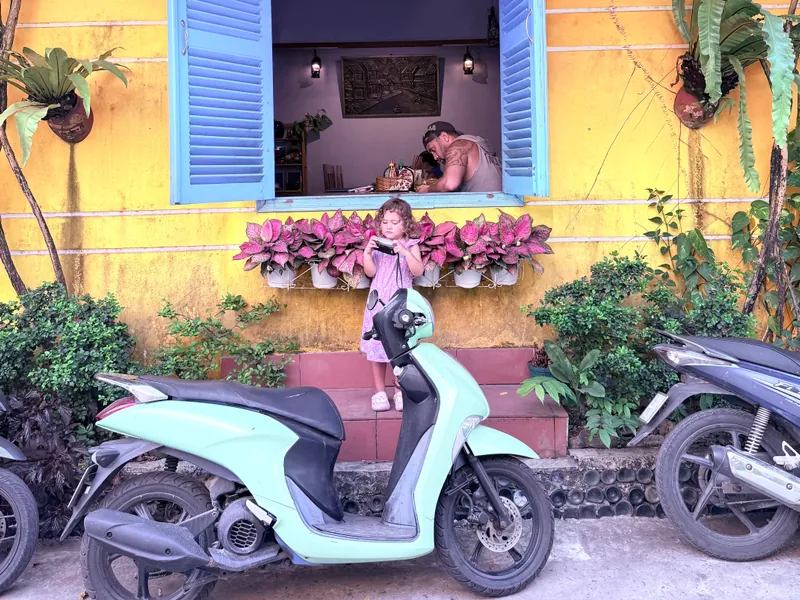
Activities & Experiences
| Category | VND | USD | AUD | NZD |
|---|---|---|---|---|
| Monthly Total | 2M - 6M+ | $82 - $246+ | $117 - $352+ | $131 - $394+ |
| Tours & water sports | free - 10M | free - $410 | free - $586 | free - $657 |
| Educational activities | free - 3M | free - $123 | free - $176 | free - $197 |
Note: Museums, cultural sites, and many beach activities can be free or low-cost
Items that were surprisingly affordable:
- Fresh produce: Local markets offer amazing variety at low prices
- Seafood: Fresh catch daily at local prices
- Local restaurants: Authentic Vietnamese food wasn’t too different to mainland prices
- Beach activities: Many free or low-cost options
5. Activities When Beaches Aren’t Enough
For many people, beaches get old after a few weeks, even for kids who love the ocean. Here’s how we kept our worldschooling engaging:
Beach
- Regular beach exploration and water activities
- Sandcastle building and beach games such as volleyball
- Sunset watching and nature journaling. Even if the kids don’t want to come, this is something I always enjoy on Phu Quoc
- Tide pool exploration: Discovering marine life in natural aquariums (great at Rory’s Beach Bar)
- Beach cleanups: Environmental education and community service (make sure it is well organised though, otherwise the trash ends up back at the beach)

Snorkeling
- Snorkeling lessons and marine life discovery (more fun with other families on a boat tour)
- Snorkeling as science class: Learning about coral reefs, fish identification, and marine ecosystems
Cultural Exploration
- Local market visits: Learning about Vietnamese food culture and bargaining skills (be warned if you have sensitive children, the main markets under the bridge at Phu Quoc City may have confronting dead animals on display)
- Fishing village tours: Understanding traditional island life and local customs
- Temple visits: Exploring Buddhist culture and island spirituality
- Cooking classes: Learning to prepare local dishes with fresh island ingredients
- Fishing with locals: Understanding sustainable fishing practices and local livelihoods
Adventure Learning
- Jungle national park trekking: Nature study, wildlife observation, and survival skills
- Waterfall exploration: Geography lessons about island formation and water cycles
- Motorbike island tours: Map reading, navigation, and cultural geography
- Night market adventures: Social skills, language practice, and cultural immersion
Practical Life Skills
- Basic Vietnamese language: Daily communication and cultural understanding
- Market shopping: Budgeting, planning, and cultural negotiation
- Cooking and meal planning: Nutrition, budgeting, and cultural appreciation
Rainy Day Alternatives (Essential for Island Life!)
- Table tennis available at some resorts
- Pool tables in some bars and resorts
- Chess and other board games often available at resorts
- Craft projects using local materials: Shell art, driftwood sculptures, natural dyes
- Movie nights with educational content: Documentaries about marine life, Vietnamese culture
- Cooking projects with local ingredients: Chemistry, math, and cultural studies combined
6. Supply Runs and Logistics Management
The Island Supply Challenge: What’s Available vs What You Need
Thankfully, we didn’t have any issues getting anything and everything we needed. Most things are available at the big shopping mega mart, King Kong. You’ll always pay a bit more when shopping at King Kong vs shopping in the local markets.
What’s readily available on Phu Quoc:
- Fresh produce: Amazing variety at local markets, and still a bit available from local vendors in the alleys
- Seafood: Daily fresh catch at local prices
- Basic household items: Cleaning supplies, basic toiletries
- Local foods: Rice, noodles, spices, traditional ingredients
Anything you can’t find at King Kong, you can likely order on Lazada and get it delivered directly to your accommodation in a few days.
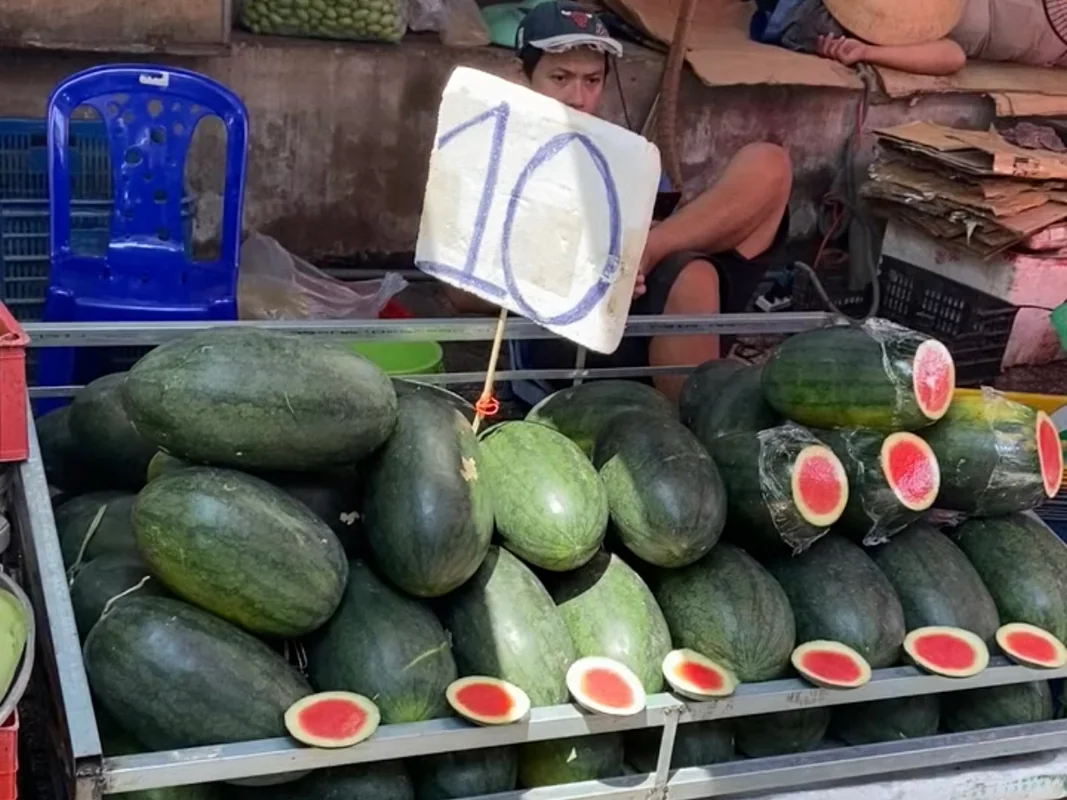
7. Transportation: Getting Around Phu Quoc with Kids
Transportation on an island with kids requires careful planning and realistic expectations. Here’s what we learned about getting around Phu Quoc safely and efficiently:
Motorbike Reality: Our Favourite Island Transport
Road Conditions and Safety with Kids:
- Road quality varies: Some areas have excellent roads, others are rough dirt tracks
- Traffic patterns: Generally lighter than mainland Vietnam, but still requires caution
- Weather impact: Roads can become slippery during rainy season
- Construction zones: Ongoing development means road conditions change frequently
Safety Essentials for Families:
- Helmet availability: Children’s helmets are available but bring your own for best fit
- Route planning: Stick to main roads when possible, avoid isolated areas
- Weather awareness: Check conditions before long trips
Alternative Transport Options:
- Grab cars: Available and well priced
- Bicycle rentals: Good for short distances and older kids
- Walking: Limited to immediate area around accommodation
- Private drivers: Can be arranged for day trips and airport transfers
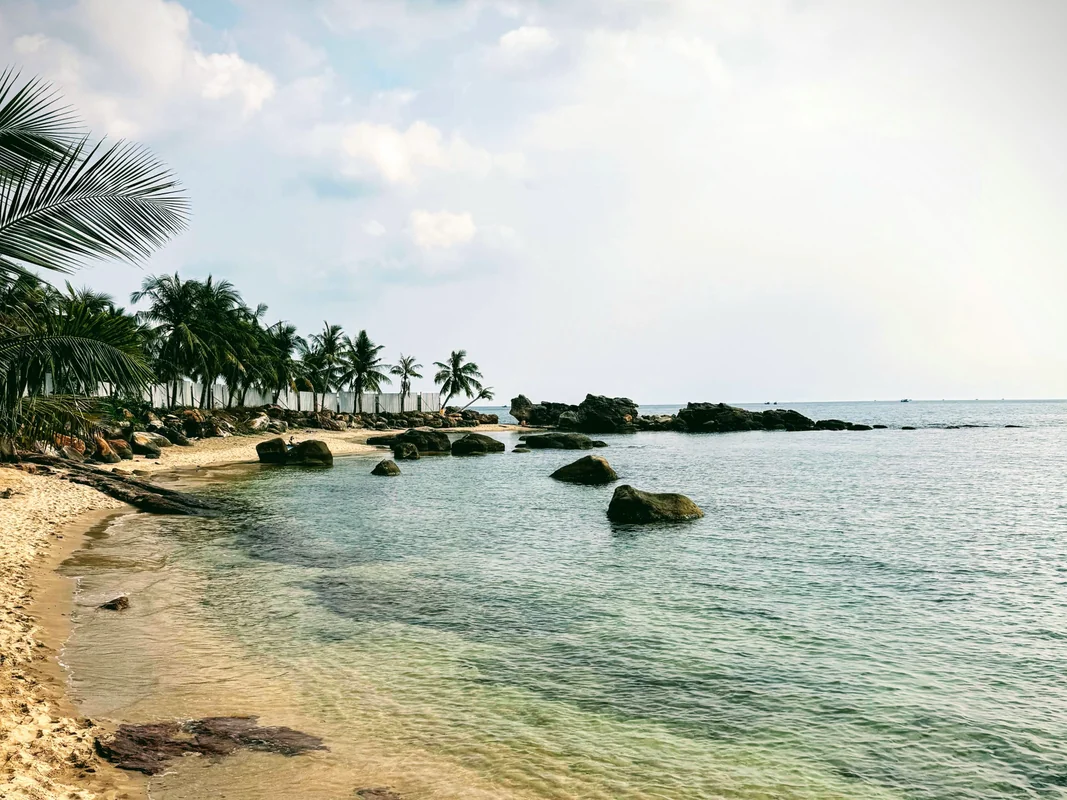
8. Health and Safety on an Island
Pharmacies are available. There’s a local hospital and even an international hospital (Vinmec) on the island. In case of an accident or if you need any medical treatment you’ll be looked after.
What to be careful of
Mosquitoes: Take precautions. Dengue is a thing in these parts and we know a couple of families with children who caught dengue during our visits.
Food: In all the time we’ve spent in Vietnam we’ve never really had issues with food. Generally, most places are taking good care of food preparation. Make sure food is cooked fresh and you will likely be ok.
Water: You cannot drink tap water (although we brush our teeth and rinse toothbrushes here without any issues). Make sure to use bottled or filtered water only.
Toilets: Don’t flush toilet paper. Use the bidet and put paper in the waste buckets. Carry a pack of tissues when you’re out and about in case you need to stop somewhere that doesn’t have toilet paper.
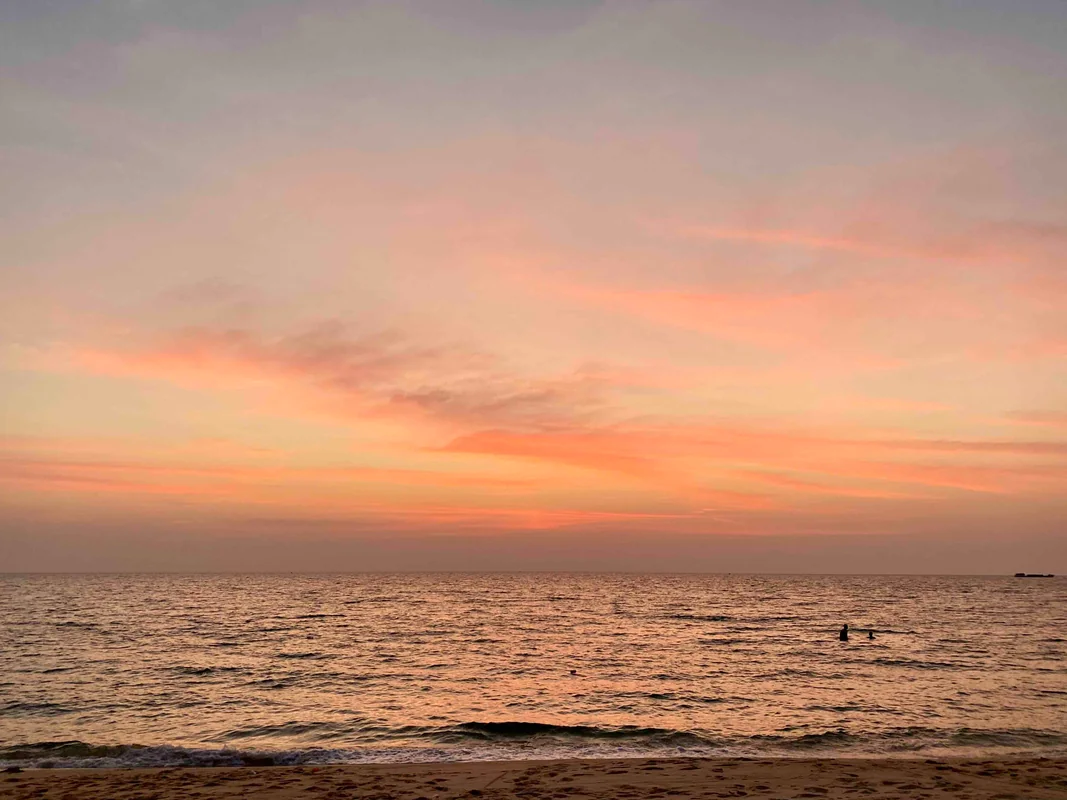
9. Social Life and Community
Building community on an island is essential for worldschooling families. Here’s how we connected with both expat families and local communities in Phu Quoc:
Worldschooling Family Network: Finding Your Island Family
Meeting Other Families with Kids:
- Worldschooling and Digital Nomad Facebook groups: Active communities for families and digital nomads
- Resort activities: Many resorts organize family-friendly events
- Beach meetups: Regular gatherings at popular family beaches
Seasonal Variations in Family Presence:
- Peak season: More families during dry season (December-March)
- Low season: Fewer families during monsoon (June-September)
- Digital nomad community: More consistent presence year-round
- Local expat families: Smaller but more stable community (but less common to find long term families on Phu Quoc)
Worldschooling in Phu Quoc
Our Phu Quoc Worldschooling Experience Over the Years:
When we first arrived on Phu Quoc in December 2020, there were very few families travelling. It was our family living on a resort with a bunch of digital nomads and expats. So we found things to do together as a family. Fortunately, at that time, our kids were happy enough to come out and enjoy Phu Quoc with us.
When we returned in February 2023, it was because a worldschooling hub was visiting for a month and they were staying not far from the resort we stayed from January-March 2021. We decided to stay at our favourite resort, Le Forest, and travelled there with a few other families we’d met while travelling in Bulgaria.
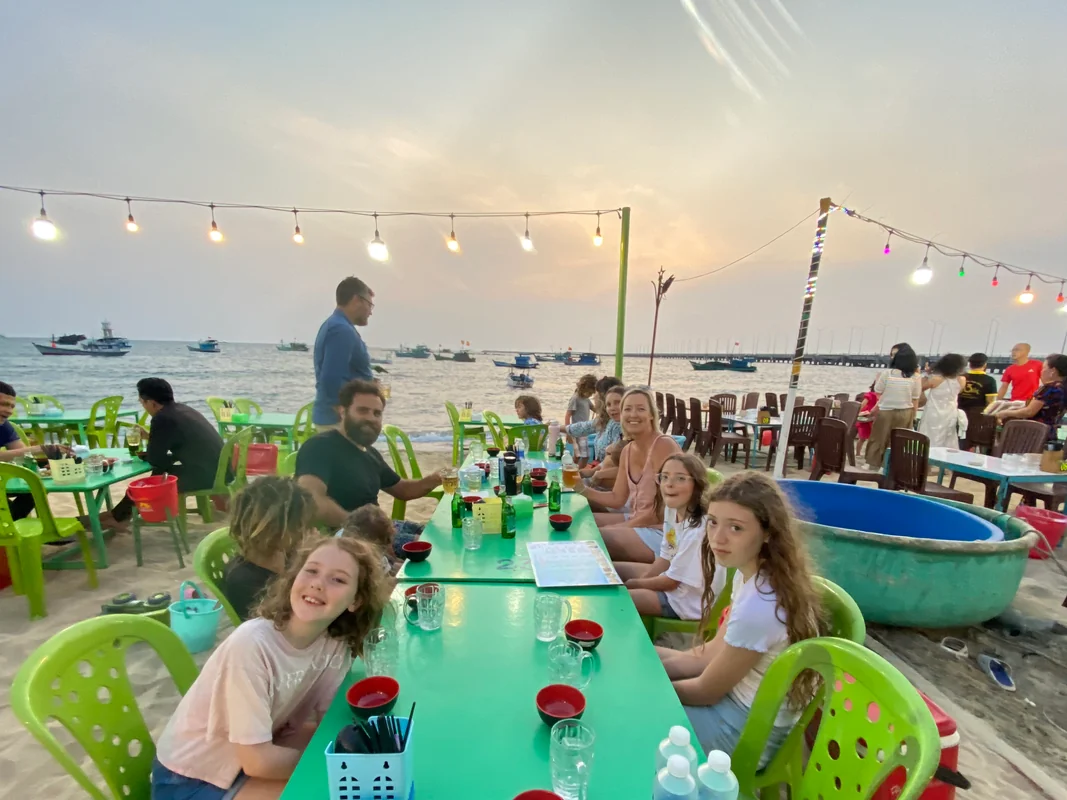
We loved making Le Forest our base during the 2023 hub. There were over 25 families and we met for many activities. We didn’t opt to do the hub itself, as we aren’t really structured people. We don’t enjoy running on a schedule and prefer to enjoy each day as it comes.
During the time the 2023 hub ran, we joined families on a island boat tour, and we also arranged a couple of buses to take us up to Starfish beach, and we arranged another day trip out to Rory’s Beach Bar. My older children loved joining the hub families at the water park.
When we returned again in 2025, a different worldschooling hub program had begun. They run two week hubs from our favourite resort. We arrived after the start of their February hub and moved resorts just after they started the March hub.
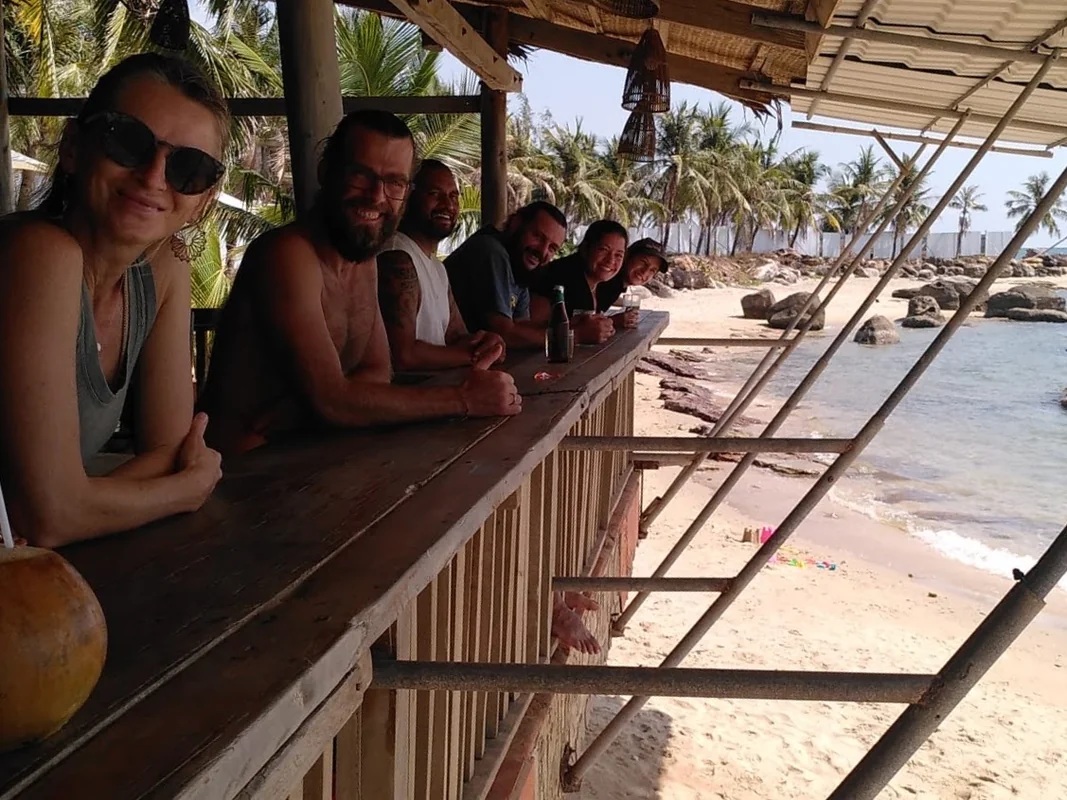
What we can tell you about this hub that still runs in selected months from Le Forest Resort:
We loved the family, Daniela and Fernando are such lovely people with commitment to bringing families together. They’ve attracted many families new to worldschooling to join these short, taste test style hubs.
These kind of hubs work for families who can make the itinerary work. For me as a digital nomad, I often just want to chill on my down days. I don’t want a fully packed schedule with two weeks of activities. Also, my family is mostly like me. My kids like a lot of chill time. They enjoy reading books, hanging in hammocks and absorbing the slow travel lifestyle. They aren’t keen for early starts and frequent tours. However, most of the families we met during our time at the resort highly recommended the hub and really enjoyed their time joining in.
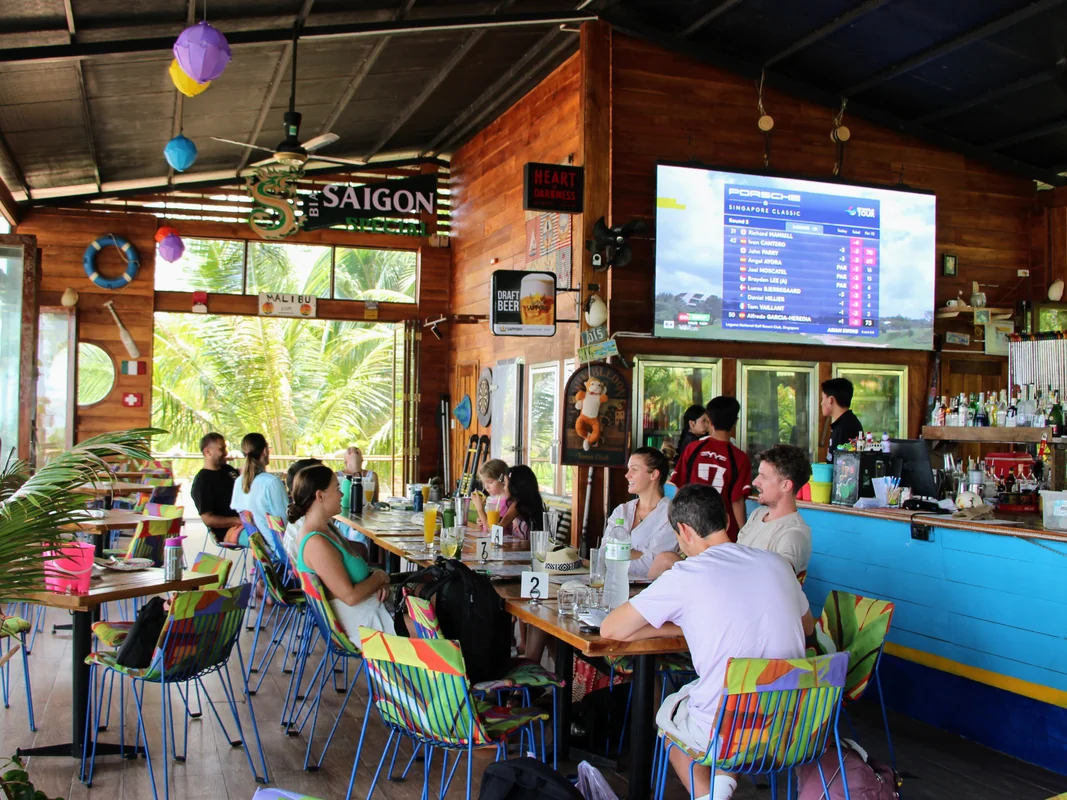
If you’re deciding if this kind of hub is for you, weigh up what you’re looking for:
- If you’re looking to join a hub for a couple of weeks and explore the main sights and attractions over the two weeks, the hub is a great plan
- It’s also good for joining for the two weeks and then extending your stay, as I’m sure you’ll discover other families will stay on for a month, or return for a second hub experience
- It’s also a great little getaway if you’re based somewhere else and looking to escape weather in another part of the world!
If you’re looking for a less formal hub or community, and you’re looking for a more steady, long-term, slow travel base, you may like to look into the Hoi An worldschooling community. This one is filled with longer term families who work together to enjoy sports, beach meet ups and all kinds of activities.
Local Community Connection: Building Meaningful Relationships
Respectful Engagement Strategies:
- Learn basic Vietnamese: Essential for meaningful interactions
- Understand local customs: Respect cultural differences and traditions
- Support local businesses: Shop at local markets and family-run establishments
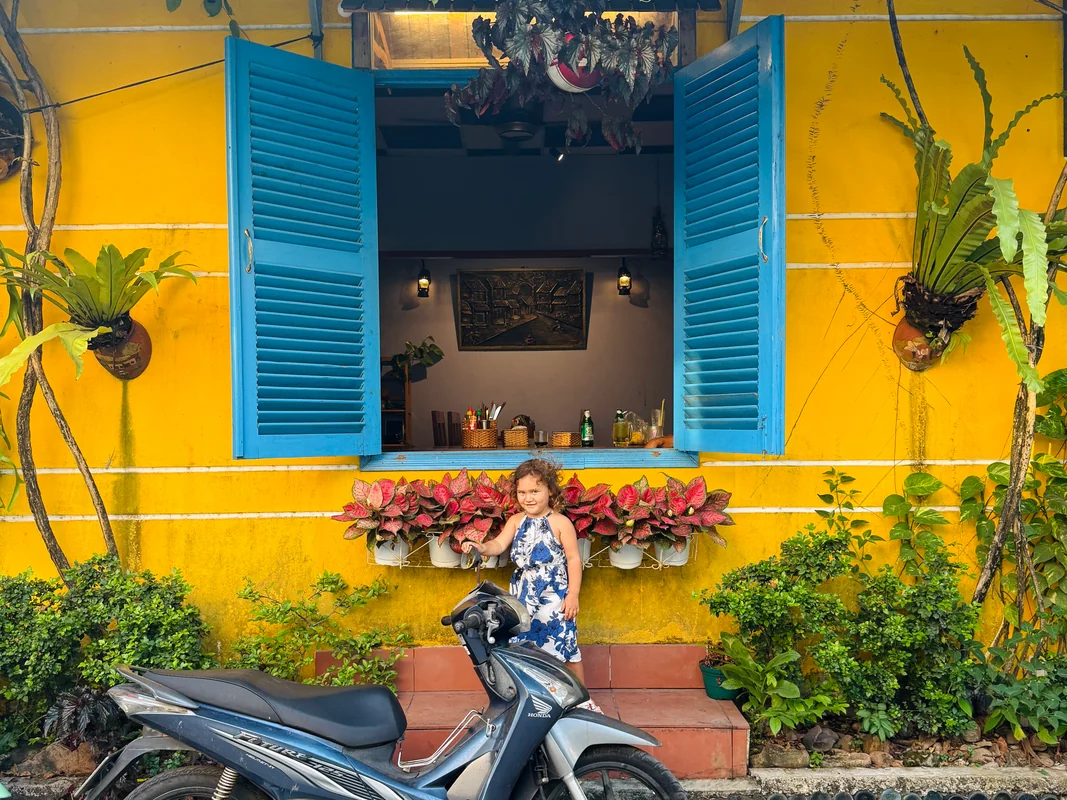
10. Seasonal Considerations
Understanding seasons is crucial for planning your island worldschooling experience. Here’s how different seasons affect daily life and learning in Phu Quoc:
Best Family Months: November-March (Dry Season)
Weather Conditions:
- Temperature: Comfortable 25-30°C (77-86°F)
- Humidity: Lower than other seasons, more comfortable
- Rainfall: Minimal, mostly sunny days
- Wind: Gentle breezes, perfect for outdoor activities
Activities and Learning Opportunities:
- Outdoor learning: Perfect weather for nature studies and beach activities
- Water activities: Snorkeling, swimming, and boat trips ideal
- Cultural exploration: Comfortable for market visits and temple tours
- Social opportunities: More families present, better community building
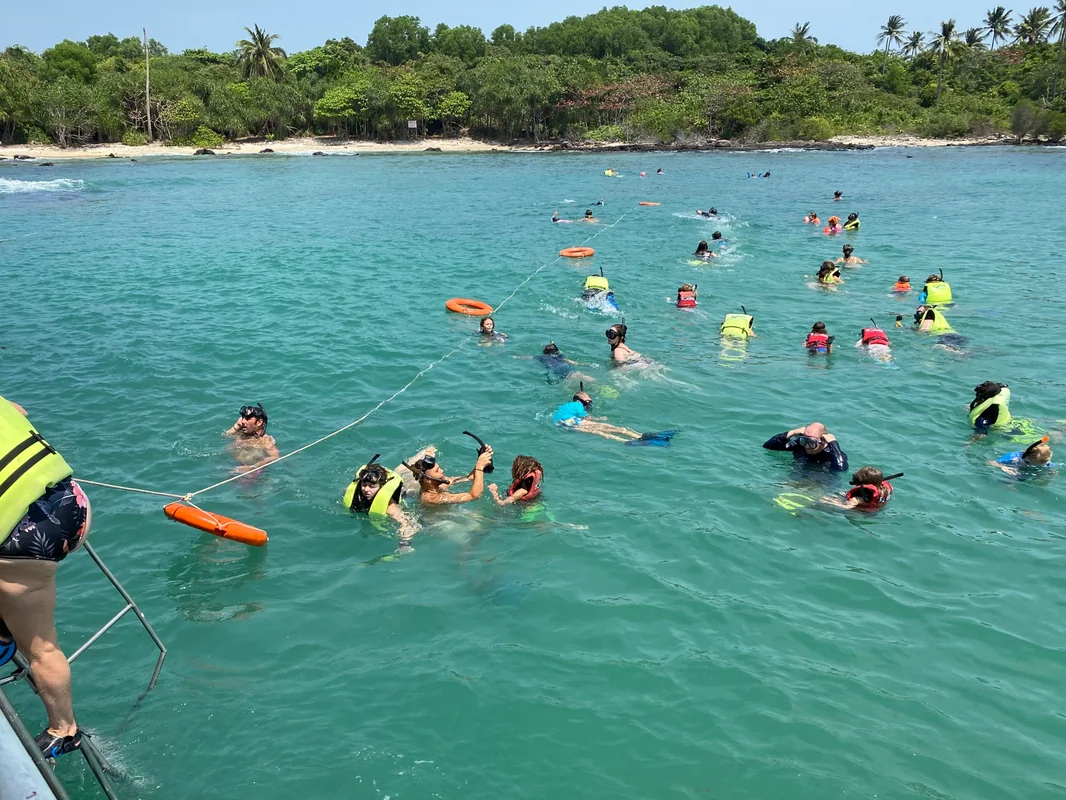
Challenging Seasons: June-September (Monsoon Season)
We haven’t travelled to Phu Quoc during the monsoon season yet. However, after living through multiple typhoon seasons in Central Vietnam, we wouldn’t let monsoon season be a reason to stop us from visiting. We hear from the locals that the rain is heavy but rarely lasts all day. If you’re looking for the best pricing and a restful, peaceful time on the island, then the low season could work well for you.
Weather Challenges:
- Heavy rainfall: Daily downpours, less outdoor time, more mosquitos
- High humidity: 80-90% humidity, uncomfortable at times
- Storm conditions: Can affect transportation (flooding in some places) and internet
- Limited activities: Many outdoor activities cancelled or limited (for example, the starfish at Starfish Beach generally leave the beaches around end of March / April and return around October / November)
Adapting Learning and Activities:
When it’s dry, you make the most of the sunshine and get out and about. It’s not going to rain all day every day. More likely, is a downpour and then normal daily life.
- Indoor learning: Focus on indoor activities and online classes
- Cultural activities: Visit indoor markets, museums, and cultural centers
- Creative projects: Art, crafts, and indoor games
- Language learning: Intensive Vietnamese lessons and cultural studies
Frequently Asked Questions
Is Phu Quoc good for worldschooling families?
Yes, absolutely! We’ve returned to Phu Quoc three times over five years, which speaks volumes. The island offers a perfect balance of relaxation, adventure, and community. With affordable living costs ($2,000-4,500 USD monthly for a family of 6), beautiful beaches, and a growing worldschooling community, it’s ideal for families seeking a slower pace of life. The island provides excellent natural learning opportunities, from marine biology through snorkeling to cultural immersion at local markets.
However, it’s best suited for families who enjoy slow travel and a more laid-back lifestyle. If your kids need constant stimulation and organized activities, you might find it challenging (though the worldschooling hubs at Le Forest Resort can help with this).
How much does it cost to live on Phu Quoc with kids?
For our family of 6, here’s our monthly budget breakdown:
- Accommodation: 15M - 50M VND ($615-$2,050 USD)
- Food: 20M - 60M VND ($820-$2,460 USD)
- Transportation: 2.5M - 4M VND ($103-$164 USD)
- Activities: 2M - 6M+ VND ($82-$246+ USD)
- Sim Card: 90K-150K VND ($3.69-$6.15 USD)
Total: Approximately $2,000-4,500 USD per month for a family of 6. You can live more affordably if you cook at home more often and choose more basic accommodation options. The island is surprisingly affordable compared to many Southeast Asian beach destinations.
What do you do when kids get bored of the beach?
This is a real concern! We’ve discovered plenty of alternatives:
Active Adventures:
- Jungle national park trekking
- Snorkeling and boat tours to outer islands
- Motorbike tours around the island
- Visit Sunworld cable car and attractions
- Explore fishing villages and local temples
Rainy Day Activities:
- Table tennis, pool tables, and chess at resorts
- Craft projects using local materials (shells, driftwood)
- Cooking classes with local ingredients
- Movie nights and documentary watching
- Indoor markets and cultural exploration
Educational Opportunities:
- Local market visits for cultural learning
- Vietnamese language practice
- Cooking and meal planning
- Wildlife observation and nature study
The key is accepting that beaches do get old, and planning for variety!
Is internet reliable enough for online school in Phu Quoc?
Generally, yes, but with some caveats:
- Mobile data: Very reliable at 130,000 VND (~$5.30 USD) per month for 150GB (5GB daily). This is your backup during power outages.
- Home internet: Usually included in accommodation, though quality varies by location
- Power outages: During storms, electricity can go out. Outages are typically short, but major storms can last longer. Having mobile data as backup is essential.
- Work-around: Coffee shops and restaurants with generators can provide internet during extended outages
Pro tip: Always have a mobile data plan as backup and communicate with your accommodation about their internet reliability before booking long-term.
What are the biggest challenges of island worldschooling?
From our experience, here are the main challenges:
1. Food Variety Fatigue We tend to visit the same restaurants repeatedly, despite many options available. The “island premium” means imported Western foods cost 2-3x mainland prices.
2. Keeping Older Teens Engaged On our most recent visit, entertaining our older teens (16-17) was more challenging. Younger kids typically love the beach life longer.
3. Island Isolation During Monsoon Heavy rains can limit activities and affect internet. The starfish even leave Starfish Beach from late March-October!
4. Medical Concerns Dengue fever is present (we know families who’ve contracted it). Mosquito prevention is crucial.
5. Transportation Limitations You’re dependent on motorbikes, e-bikes, or Grab cars. There’s no car rental option for foreigners.
The Reality: These challenges are manageable with proper preparation and realistic expectations. For us, the benefits far outweigh the drawbacks, which is why we keep returning!
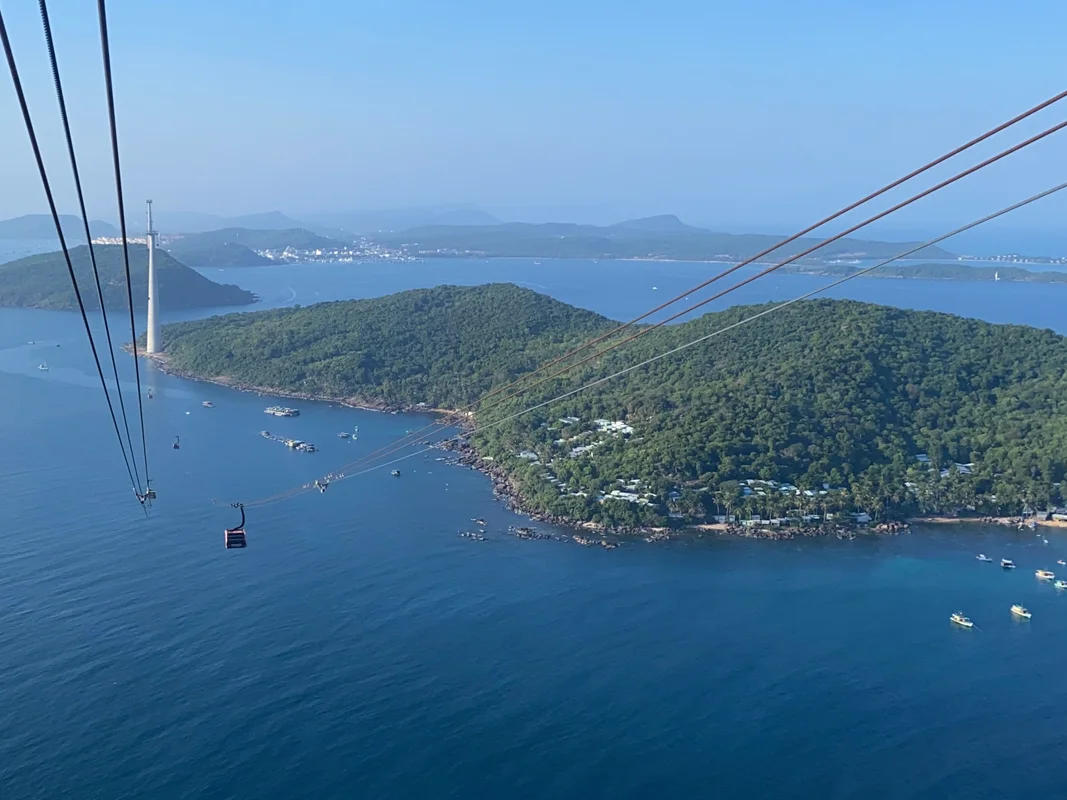
Conclusion: Our Phu Quoc Worldschooling Experience
Our assessment: Worldschooling on Phu Quoc Island has been a rewarding experience that we’ve returned to multiple times. We learned there’s plenty to do, and it’s an ideal location to really unwind and relax, with enough to do for our children.
Would we do it again? Absolutely! We love the friends we’ve made on the island and always look forward to returning. Our experiences taught our kids valuable lessons about adaptability, resilience, and finding joy in the simple pleasures of life.
For families considering Phu Quoc worldschooling, we recommend checking out the island, and going with what works for your family.
Ready to explore more worldschooling destinations? Check out our worldschooling guides and Vietnam resources for more inspiration and practical advice.
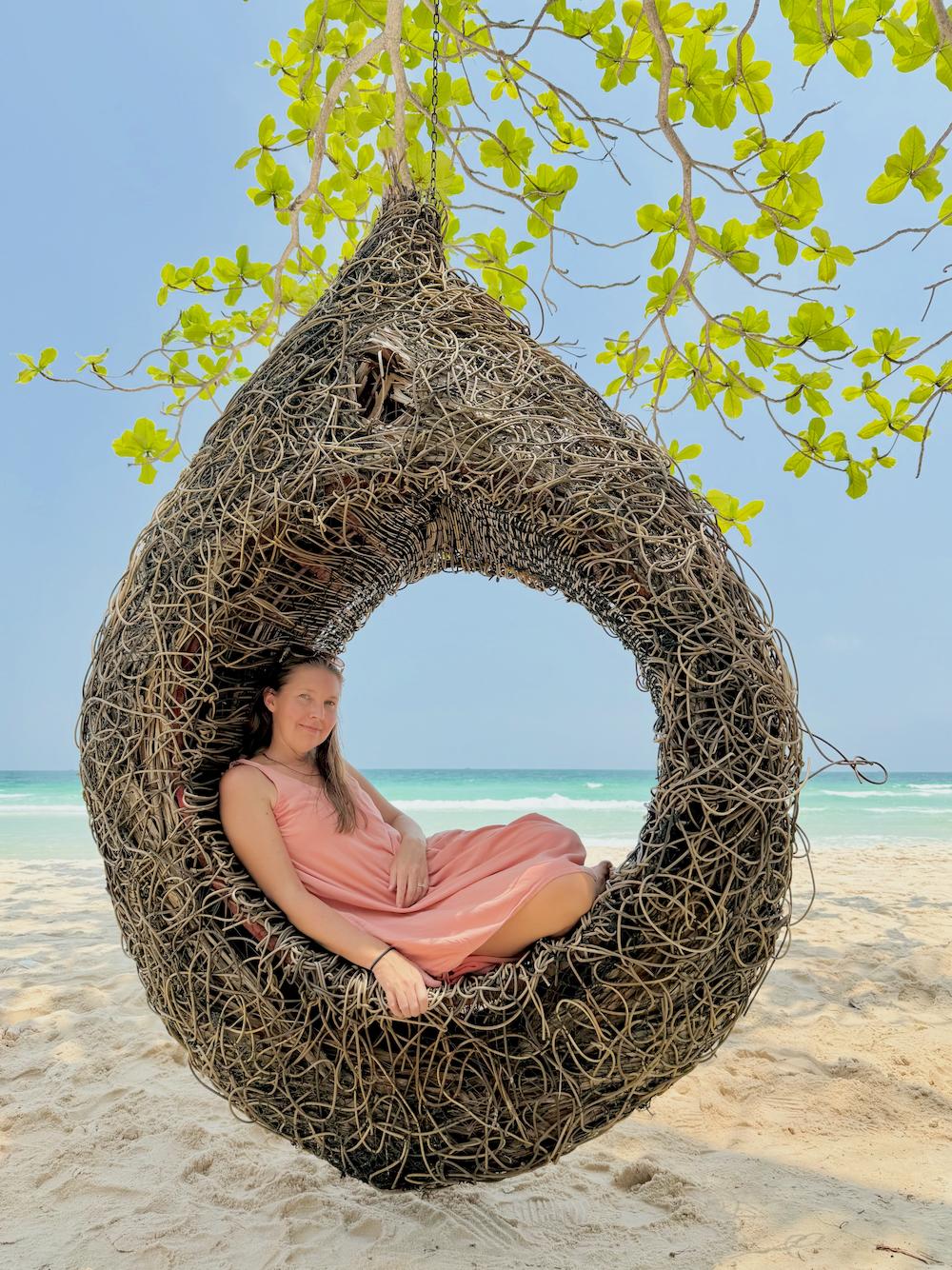
About Melissa
A family passionate about slow travel and exploring the world with our four children. We share our experiences, tips, and insights to help other families create their own travel adventures.
You might also like
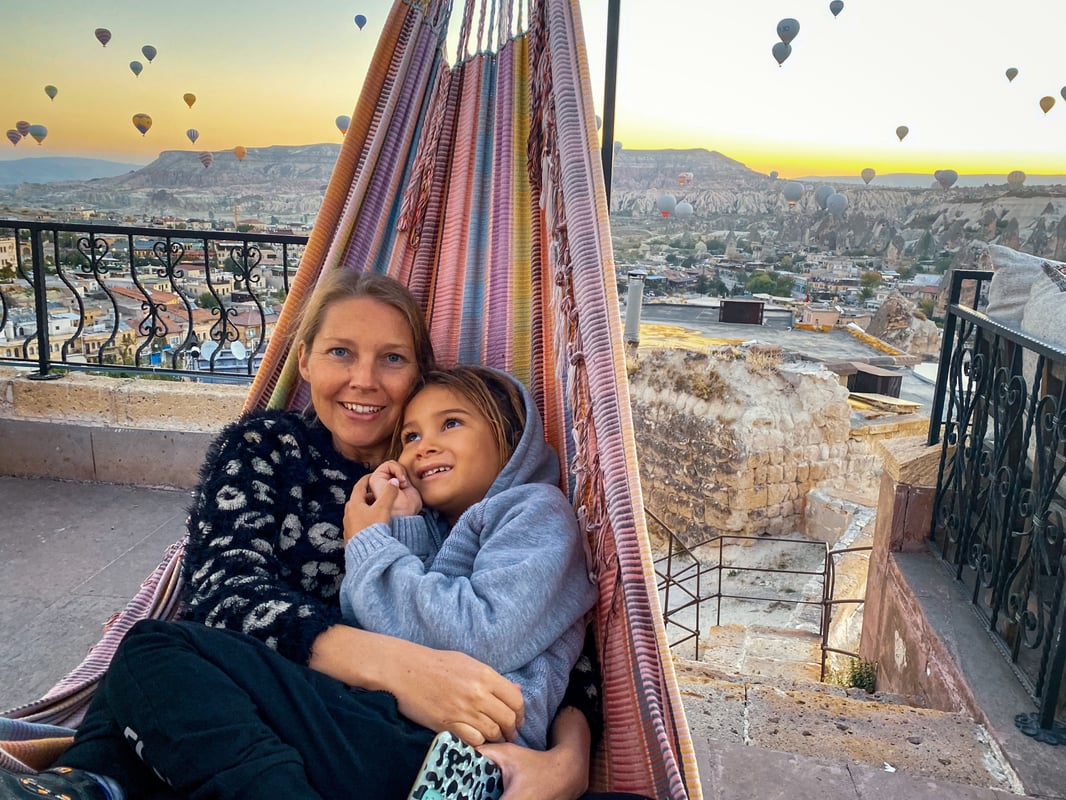
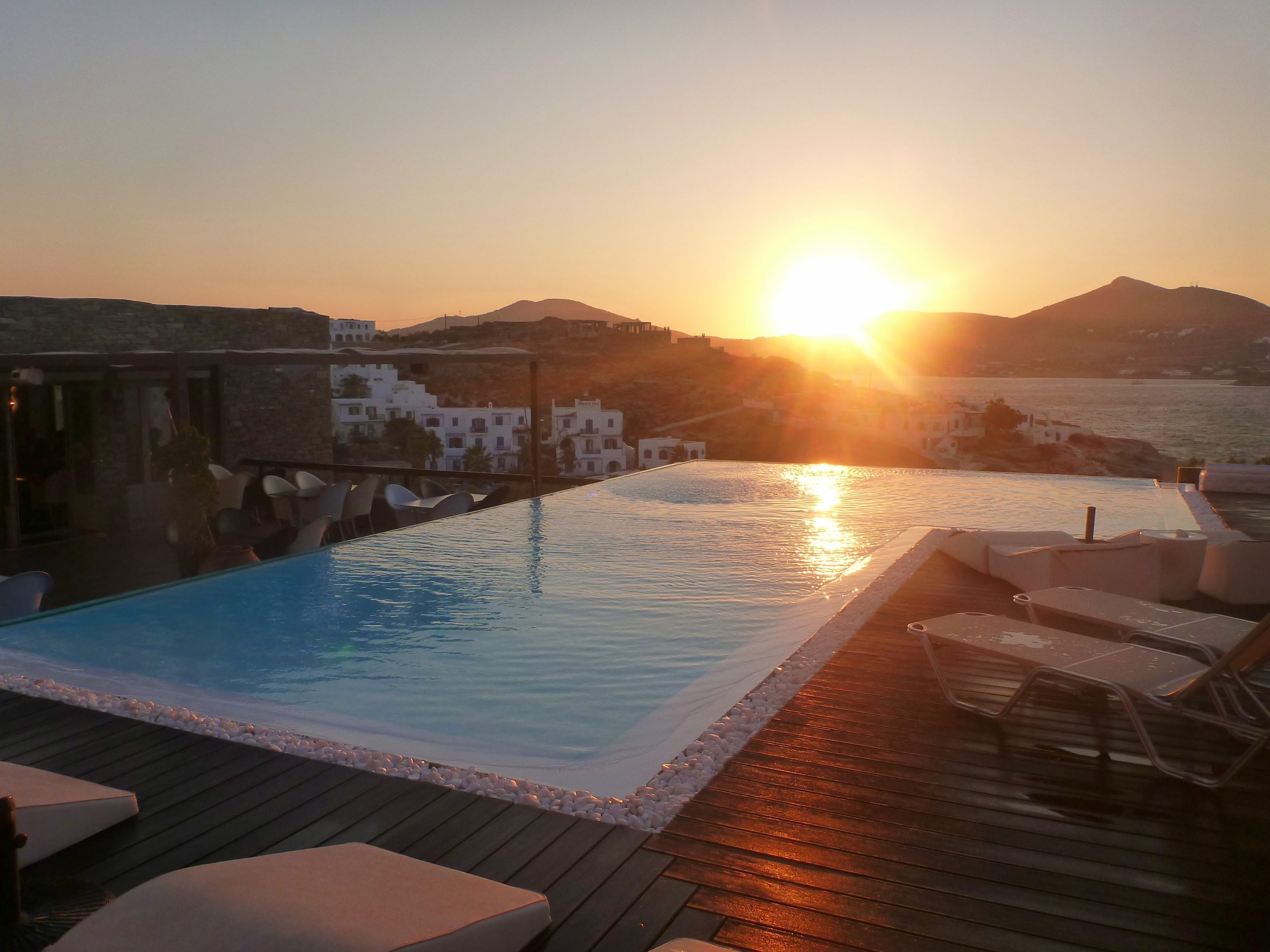
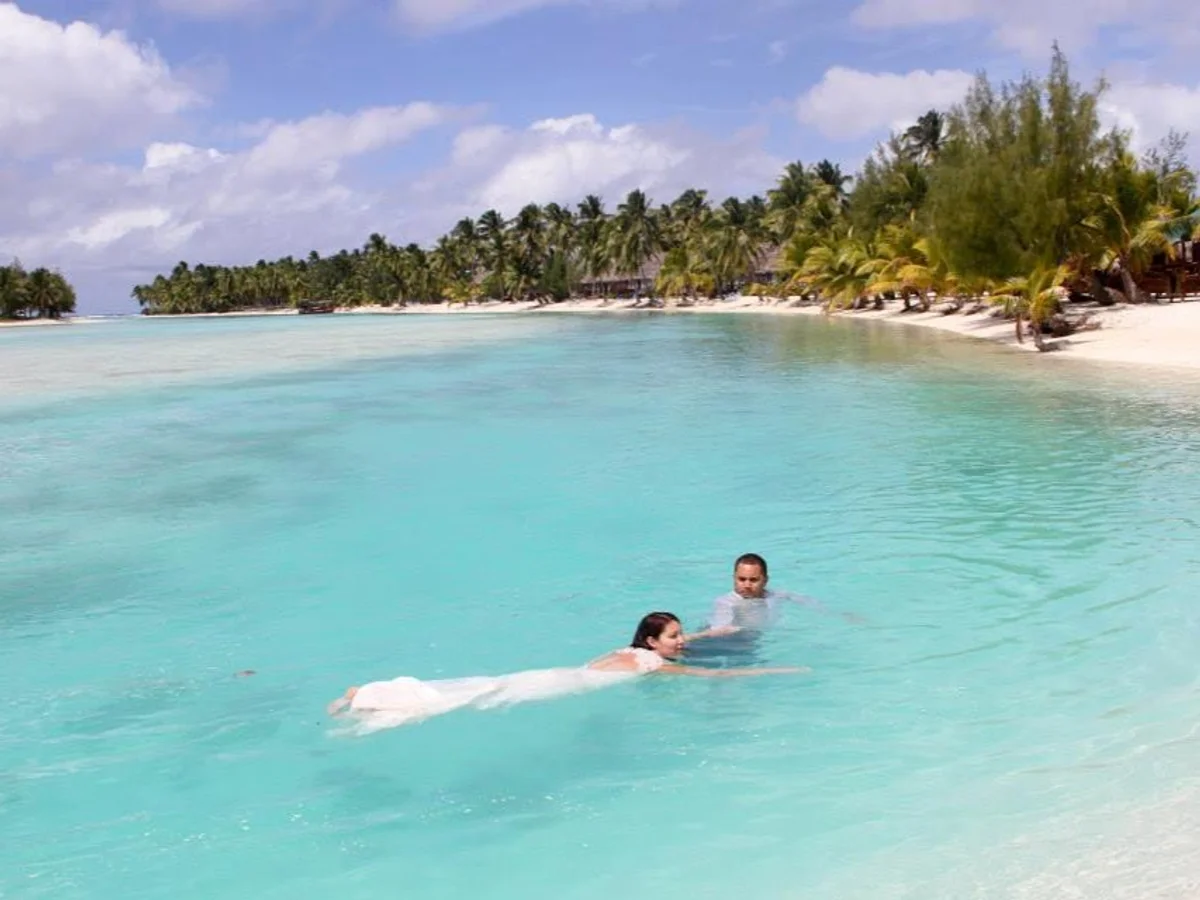
Aitutaki - The Fantasy Honeymoon Island
Discover Aitutaki, the fantasy honeymoon island in the Cook Islands. From overwater bungalows to lagoon cruises, explore this perfect romantic paradise.
Comments
Comments Coming Soon
We're working on adding a comments system to make it easier for you to share your thoughts and experiences.
In the meantime, feel free to reach out to us via our contact page or social media.
Stay Updated
Get the latest travel tips, destination guides, and family adventure stories delivered straight to your inbox.
No spam, unsubscribe at any time.
